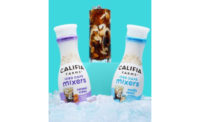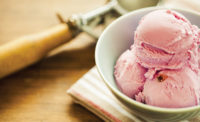Instant Indulgence

Instant Indulgence
by Julie Cook Ramirez
Seeking to replicate their favorite coffeehouse
flavors at home, consumers embrace the diverse creamer category.
There’s no doubt
about it — America is a coffee nation. From the venerable Starbucks
on every corner to trendy cafes in higher-end bookshops, coffee is
everywhere.
Today’s coffees are all about indulgence: Mix in
the caramel, the chocolate, the raspberry, the liqueur. And while
you’re at it, top it off with whipped cream.
With the coffee craze showing no signs of slowing
down, it comes as no surprise that consumers are seeking to replicate their
favorite coffeehouse tastes at home. One visit to the coffee aisle in any
major grocery store and you’ll find flavored coffee beans from
specialty coffee companies, as well as more mainstream coffee makers.
But flavored beans only begin to approximate the
coffeehouse experience. For a growing number of consumers, flavored
creamers are where it’s at. From mainstream favorites like French
vanilla and hazelnut to more exotic fare, such as southern butter pecan,
vanilla toffee caramel, dulce de leche and crème brulee, creamer
manufacturers have spent the last several years developing and introducing
a wide variety of creamers designed to suit just about everyone’s
preference.
Consumers are most definitely responding. Sales of
refrigerated creamers — which boast the largest number of flavored
products — rose 8.4 percent in dollars and 1.5 percent in units
during the 52-week period ending November 27, 2005, according to
Chicago-based Information Resources Inc. (IRI). That growth is driven
almost entirely by flavored products, which account for fully 75 percent of
all refrigerated creamer sales, according to Kim Peddle Rguem, marketing
manager for Glendale, Calif.-based Nestlé USA Inc.’s
Coffee-Mate brand.
By contrast, sales of shelf-stable (powdered) creamers
— the vast majority of which are unflavored — rose a mere 0.8
percent in dollars, while falling 4.4 percent in units during the same time
period, according to IRI.
While the preference for flavored creamers clearly
plays a role, the reasons for the lackluster performance of shelf-stable
creamers are numerous, according to Rob Gregg, vice president of marketing
and general manager of indulgent brands for White Wave Foods, a Broomfield,
Colo.-based subsidiary of Dean Foods, which markets International Delight
coffee creamer and Land O’Lakes half & half. One of the key
reasons for the shift, Gregg says, is that liquid creamers provide a
“smoother, richer, creamier cup of coffee” than do powders.
| TOP 10 DAIRY CREAM/HALF & HALF BRANDS* | ||||
| $ Sales (In Millions) | % Change vs. Year Ago | Unit Sales (In Millions) | % Change vs. Year Ago | |
| Total Category | $551.9 | 3.3% | 285.7 | -2.4% |
| Private Label | 244.2 | 4.9 | 128.2 | -0.3 |
| Land O’Lakes | 47.8 | 10.5 | 19.3 | 1.0 |
| Land O’Lakes Ultra Fresh | 39.7 | 4.7 | 22.5 | -2.1 |
| Hood | 26.1 | -1.9 | 12.5 | -5.8 |
| Garelick Farms | 19.6 | 12.7 | 9.4 | 8.4 |
| Nestlé Coffee Mate | 14.0 | 42.8 | 6.1 | 34.5 |
| Dean’s | 12.4 | -1.8 | 7.2 | -8.9 |
| CF Burger | 8.3 | -0.1 | 3.4 | -4.2 |
| Darigold | 7.0 | 14.1 | 3.5 | 3.5 |
| Hiland | 6.6 | -27.4 | 4.3 | -23.5 |
| * Total sales in supermarkets, drug stores and mass merchandisers, excluding Wal-Mart, for the 52-week period ending November 27, 2005. SOURCE: Information Resources Inc. | ||||
Peddle Rguem agrees, adding that convenience and ease
of use have played a big role in the decline of powdered creamers and the
ascendance of refrigerated creamers. “With the liquid creamers,
people can just pour it in the bottom of a mug and then add coffee on top
of it,” she says. “It cools the coffee to a nice temperature,
and they don’t even have to stir.”
Generation Gap
Demographic factors are also at play, according to
Peddle Rguem, who says shelf-stable creamers are purchased mostly by older
consumers, primarily out of habit. When they first started adding cream to
their coffee, she explains, powdered products were the only alternatives to
milk and cream. Meanwhile, younger consumers have grown up with
ready-to-serve products, and are more likely to gravitate toward the
pour-and-serve creamers. What’s more, Gregg adds, powdered creamers
tend to be less expensive, making them the more economical choice those on
a fixed income.
That’s not to suggest that creamer companies are
giving up on powdered products. On the contrary, they continue to invest in
the segment. Nestlé, whose Coffee-Mate product holds the top spot
among both refrigerated and shelf-stable creamers, introduced Latte
Creations, a shelf-stable powdered product that delivers “quite a
nice head of foam and a milky latte taste profile,” Peddle Rguem
says.
But it’s clear their primary focus is on the
refrigerated, mostly flavored, end of the business.
In response to growing concerns over the health risks
of trans fats, International Delight recently announced the elimination of
partially hydrogenated soybean oil from its entire product line, including
all sizes of refrigerated creamers and shelf-stable portion control cups.
According to Gregg, the change in formulation not only resulted in a
healthier creamer for consumers, but a better-tasting one as well.
Spice of Variety
International Delight also recently unveiled its first
co-branded flavor, Hershey’s Chocolate Caramel. The product was
originally introduced as a seasonal product, available in portion-control
cups in convenience stores and gas station coffee services. According to
Gregg, so-called alternate channels, such as convenience stores and gas
stations, present an enormous opportunity for companies like International
Delight. Not only does it tend to boost overall consumption of its
products, but it also creates trial among those consumers who either
haven’t tried the brand before or have yet to discover the benefits
of liquid creamers.
Likewise, Peddle Rguem says the club channel has
become a major focus for Nestlé, which introduced a liquid
concentrate Coffee-Mate creamer in Sam’s Club stores. The
shelf-stable product comes in a 2-liter pump bottle, making it ideal for
use inconvenience stores and small businesses.
In the retail grocery segment, Nestlé has
launched a number of rotating and seasonal Coffee-Mate flavors, including
Pumpkin Spice, Peppermint Mocha, Toffee Nut, Crème Brulee,
Gingerbread and Egg Nog. The company’s most recent promotion
encourages consumers to “choose coffee’s next perfect
mate” by voting for which indulgent new flavor they would like to see
in their grocery store. Their choices are Coconut Cream, Vanilla Chai
Spice, Chocolate Orange Truffle and the Hispanic-influenced Tres Leches.
A tie-in promotion with the American Historic Inn
Association offers Land O’Lakes half & half consumers the
opportunity to win an all-expense-paid trip to one of America’s most
romantic bed and breakfasts. According to Gregg, the “Get Away with
Your Better Half” sweepstakes is designed to bring some excitement to
the somewhat lackluster half & half category and help it to shed its
commodity image.
Chelsea, Mass.-based HP Hood sought to add some
excitement to the half & half category when it introduced Simply Smart
Fat Free Half & Half. Meanwhile, Coffee-Mate became one of just a few
brands to sell a flavored half & half by introducing a vanilla variety; other flavors could be in the offing.
Seeking to answer the growing demand for more soy
products, Nestlé recently launched two soy-based Coffee-Mate
creamers — original and vanilla — regionally in the Pacific
Northwest.
“There are people who really like soy products,
but there are a lot of people out there who think that soy has a beany
taste that’s not very good,” Peddle Rguem says. “We are
really trying to shift that paradigm and say, ‘Hey, you can have
great taste and get the goodness of soy at the same time.’”
Julie Cook Ramirez is a freelance journalist based in
the Chicago area.
Looking for a reprint of this article?
From high-res PDFs to custom plaques, order your copy today!




